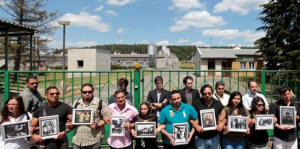|
Czech pig farm to quit WW2 Roma
concentration camp site
 Send a link to a friend
Send a link to a friend
 [August 10, 2017]
By Robert Muller [August 10, 2017]
By Robert Muller
PRAGUE (Reuters) - The Czech government has
persuaded an agricultural firm to sell a pig farm partly covering the
site of a World War Two Nazi concentration camp where most of the
victims were Roma.
The firm, AGPI, said on Monday it had accepted an undisclosed financial
offer from the government.
The agreement is a turning point in over two decades of attempts to
close down the farm.
The center-left government of Prime Minister Bohuslav Sobotka had
entered talks with AGPI in November 2016, with the Culture Ministry
representing the government in the talks.
"I can confirm that AGPI has decided to accept the offer made by the
Ministry of Culture," AGPI Deputy Director Jan Cech told Reuters.

AGPI will get financial compensation from the state, the company said in
a statement. The parties had agreed not to disclose the amount.
"I welcome the decision, we move step by step towards a definitive
solution of the whole issue," Culture Minister Daniel Herman told public
Czech radio. He said a deal could be signed by the government and AGPI
in the first weeks of September.
In 1940, first prisoners arrived in Lety, then a labor camp, 80 km (50
miles) south of Prague. Two years later, the Nazi occupation authorities
changed it to concentration camp, with 1,145 inmates, mostly Roma, as of
August 1942.
More than 300 people, mostly children under 14 years, died in Lety
itself, mainly due to a typhus epidemic, while another 420 were sent to
the Auschwitz death camp.
[to top of second column] |

Participants of the European Meeting of Antiracist Leaders hold
pictures in front of a pig farm, situated at the site of a former
Roma concentration camp, to commemorate victims of the Holocaust
during World War Two in the village of Lety June 13, 2014.
REUTERS/David W Cerny/File Photo

Late president Vaclav Havel and other officials unveiled a memorial
at Lety in 1995. The pig farm, which overlaps the concentration camp
location, has remained operational although several successive
governments had pledged to remove it.
Human rights organizations welcomed the fresh deal.
"Today marks a historical day for the dignity of Roma people, and a
historical victory for the European civil society," Benjamin Abtan,
president of European Grassroots Antiracist Movement, said in a
statement emailed to Reuters.
"Together, activists and political leaders, Roma and non-Roma, Czech
and other Europeans, we have turned Lety from a symbol of shame to
that of victory and dignity.
(Reporting by Robert Muller Editing by Jeremy Gaunt)
[© 2017 Thomson Reuters. All rights
reserved.]
Copyright 2017 Reuters. All rights reserved. This material may not be published,
broadcast, rewritten or redistributed.
 |